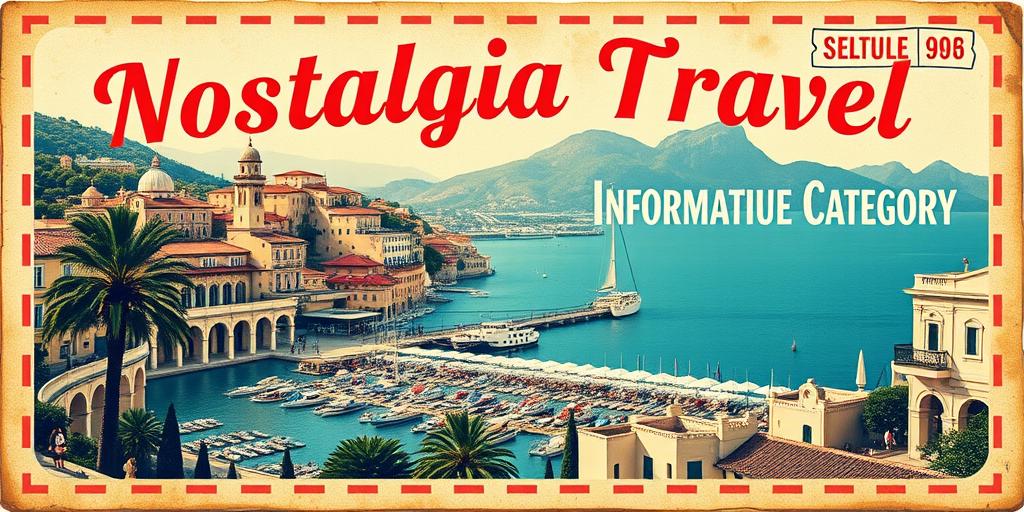Nostalgia Travel: Revisiting Past Trends in 2025
In an era defined by rapid technological advancement and ever-changing trends, a counter-movement has been quietly gaining momentum: nostalgia travel. As we approach 2025, this trend is set to become even more prominent, with travelers increasingly seeking to reconnect with the past. This article explores the rising popularity of nostalgia travel, what drives it, and what forms it might take in the coming years.
What is Nostalgia Travel?
Nostalgia travel involves visiting destinations, participating in activities, or experiencing events that evoke fond memories of the past. It’s about more than just seeing historical sites; it’s about reliving or re-experiencing moments that hold personal or collective significance. This can range from revisiting childhood vacation spots to participating in retro-themed festivals.
The Drivers Behind the Trend
Several factors contribute to the rise of nostalgia travel:
- A Desire for Simplicity: In a complex and fast-paced world, many people crave simpler times. Nostalgia offers an escape to what is perceived as a less complicated era.
- Technological Fatigue: Constant connectivity and digital overload can lead to a desire for unplugged experiences. Nostalgia travel provides an opportunity to disconnect from technology and reconnect with tangible history.
- Cultural Identity: Nostalgia can reinforce a sense of cultural identity and shared heritage. It allows travelers to explore their roots and understand the traditions that have shaped them.
- Personal Reflection: As individuals reflect on their life experiences, they may seek to revisit places and moments that were significant to their personal development.
Forms of Nostalgia Travel in 2025
As we look ahead to 2025, nostalgia travel is likely to manifest in several ways:
- Retro-Themed Destinations:
- Classic Resorts: Revivals of mid-20th-century resorts, complete with vintage décor, entertainment, and activities.
- Historic Towns: Preservation and promotion of towns that retain their historical character, offering immersive experiences of bygone eras.
- Re-enactment Events and Festivals:
- Historical Re-enactments: Large-scale re-enactments of historical events, such as battles, festivals, and cultural gatherings.
- Themed Festivals: Festivals celebrating specific decades or cultural movements, featuring music, fashion, and entertainment from the past.
- Heritage Tourism:
- Ancestral Journeys: Increased interest in tracing family histories and visiting the birthplaces of ancestors.
- Cultural Immersion: Travelers seeking authentic experiences of traditional cultures, including food, crafts, and rituals.
- Vintage Transportation Experiences:
- Classic Train Journeys: Reviving the golden age of train travel with luxury rail tours through scenic landscapes.
- Vintage Car Rallies: Events featuring classic cars and scenic drives along historic routes.
The Impact on the Travel Industry
The rise of nostalgia travel presents both opportunities and challenges for the travel industry. Destinations and businesses that can effectively tap into this trend are likely to thrive. This may involve:
- Preserving Historical Authenticity: Maintaining the integrity of historical sites and cultural traditions.
- Creating Immersive Experiences: Offering travelers opportunities to actively engage with the past through interactive exhibits, workshops, and performances.
- Leveraging Technology: Using technology to enhance the nostalgic experience, such as virtual reality tours of historical sites or augmented reality overlays that bring historical scenes to life.
- Catering to Different Generations: Understanding the specific nostalgic interests of different age groups and tailoring experiences accordingly.
Conclusion
Nostalgia travel is more than just a passing fad; it’s a reflection of deeper societal trends. As we move closer to 2025, the desire to reconnect with the past is likely to grow stronger. By understanding the drivers behind this trend and catering to the diverse interests of nostalgia travelers, the travel industry can create meaningful and memorable experiences that resonate with a wide audience.
